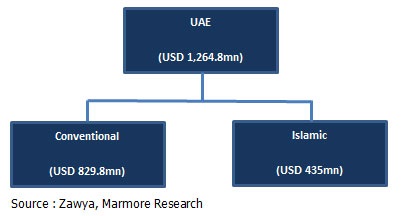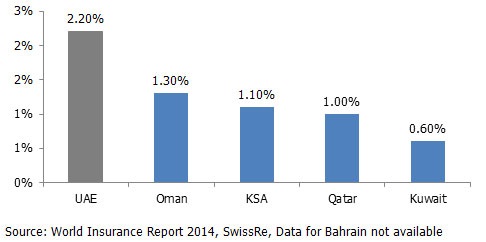According to the Marmore’s UAE Asset Management report, UAE asset management industry manages USD 1,264.8mn in assets in about 31 funds as of 21st July, 2015. In terms of products, equity funds lead the pack with 69% share, followed by specialized funds at 20%. Remainder of the assets is spread across money market and fixed income funds. Of the total assets, Islamic funds manage USD 435mn (34.4%) in assets and rest is conventional funds. In terms of the number of funds, there are 23 equity funds, 4 money market funds, 3 specialized funds and 1 fixed income fund.
AUM/GDP ratio for the UAE stands at 0.5%, implying lack of mutual fund penetration as an investment option. The UAE asset management market is small in comparison to Saudi Arabia and Kuwait. The top five asset managers (out of a total of 10) account for 75% of the total assets being managed; Abu Dhabi Commercial Bank PJSC leads the list of large asset management companies with USD 374mn in assets (29% market share), followed by Emirates NBD Asset Management Limited with USD 339mn in assets (26% share) and Abu Dhabi Investment Company with USD 153mn in assets (12% share).
Analyzing total Assets under Management based on country wise geographical focus we find that UAE stands at 6th position with USD 1,264.8 Mn of AUM. Saudi Arabia is the dominant player in the MENA asset management industry.
We look at the various participants in the UAE asset management market. They range from conventional and Islamic funds, Insurance companies, Pension funds and Sovereign wealth funds.
AUM Break Up
Total AUM can be further subdivided into Conventional Funds amounting to USD 829.8 Mn and Islamic Funds amounting to USD 435 Mn.

Figure 1: UAE Funds Break Up - Conventional and Islamic
Total AUM can be further subdidvided as Equity (USD 877.9mn), Fixed Income (USD 40.4mn) , Money Market (USD 92.3mn) and Specialized (USD 254mn).

Figure 2: UAE Funds Break up - Asset Type
Pension Funds
UAE lacks a fully developed private and employer managed pensions industry. The UAE’s total retirement benefits are worth approximately USD 3Bn and are managed by two state providers – the General Pensions and Social Security Authority and the Abu Dhabi Retirement Pensions and Benefit Fund.
Abu Dhabi Retirement Pensions and Benefit Fund
Abu Dhabi Retirement Pensions and Benefits Fund (ADRPBF) was founded in 2000 to manage contributions, pensions and end of service benefits for UAE nationals working in or retired from the government, semi- Government and private sectors in the Emirate of Abu Dhabi, and their beneficiaries. The latest available annual report (2013) shows that the fund invests in more than 50 countries.
The General Pensions and Social Security Authority
The principal activity is the administration of pension and social security insurance plans for the benefit of nationals in the government and private sectors. The authority was established in 1999.
Insurance Companies
In terms of insurance penetration, total revenue and insurance density, the UAE is the leading country in the GCC region. In 2014, the UAE insurance industry produced over USD 6.29bn of insurance revenues. This makes UAE the largest insurance market in the GCC region. The UAE has presence of both large local groups (Oman Insurance, Abu Dhabi National & Salama) and foreign insurers (RSA, AXA, Zurich).

Figure 3: GCC Insurance Penetration in 2014 (Premium as a % of GDP) (Total Business)*
The investment mix of insurance companies since 2010 shows 30% of funds allocated to high risk / high return investment especially shares out of total 60% of the funds allocated in shares and bonds. The recovery of the stock markets, the high returns generated in 2013 by the stock markets in Dubai and the inclusion into the MSCI emerging markets have increased the investor confidence.
Sovereign Wealth Funds
There are 7 Sovereign Wealth Funds (SWFs) operating in the UAE . The oldest and the largest fund by asset size is Abu Dhabi Investment Authority (ADIA). The fund was established in 1976 and has a size of USD 773bn as of July 2015 . The main funding source of the fund is from financial surplus generated through oil exports. ADIA is also the largest sovereign wealth fund in the Middle East. It is wholly owned and subject to supervision by the government of Abu Dhabi. Emirates Investment Authority (EIA) is the first federal sovereign wealth fund for all seven states comprising the UAE.
Foreign Investors
The revised UAE commercial company’s law draft has been approved by the UAE Federal National Council, as announced on 28 May 2013. The status quo in relation to the foreign ownership limit has been maintained. Existing requirement is for the UAE companies to be owned at least 51% by UAE nationals and foreign ownership is restricted up to 49%. Hence, foreign investor’s participation is currently restricted in the UAE companies. However, companies which are established in UAE free zones are permitted to be 100% foreign owned but are subject to certain trading restrictions of which investors should be aware . Companies listed on NASDAQ Dubai have no foreign ownership restrictions.
Retail Participation
UAE equity market is dominated by retail participants and they account for the bulk of trading activity. While, ultra high net worth individuals (UHNI’s) are a niche group who are predominantly served by private bankers, retail clients are a polarized group who either trade aggresively or shun markets altogether and invest in bank deposits. Analysing the data for the recent past indicate dominance of individual participants in the total value traded. Individual particpation was 57.9% in the total value traded of Dubai Financial Market. Individual participation was 65.5% in the total value traded of Abu Dhabi Securities Exchange (May 2015). The individual participation has declined in both the Dubai and Abu Dhabi stock markets compared to 2012 when it more than 70% in both Dubai and Abu Dhabi markets.
Published by: Marmore MENA

